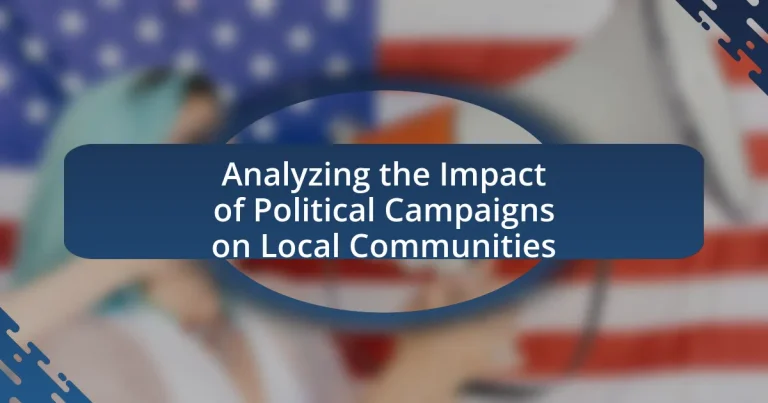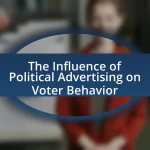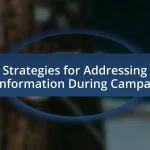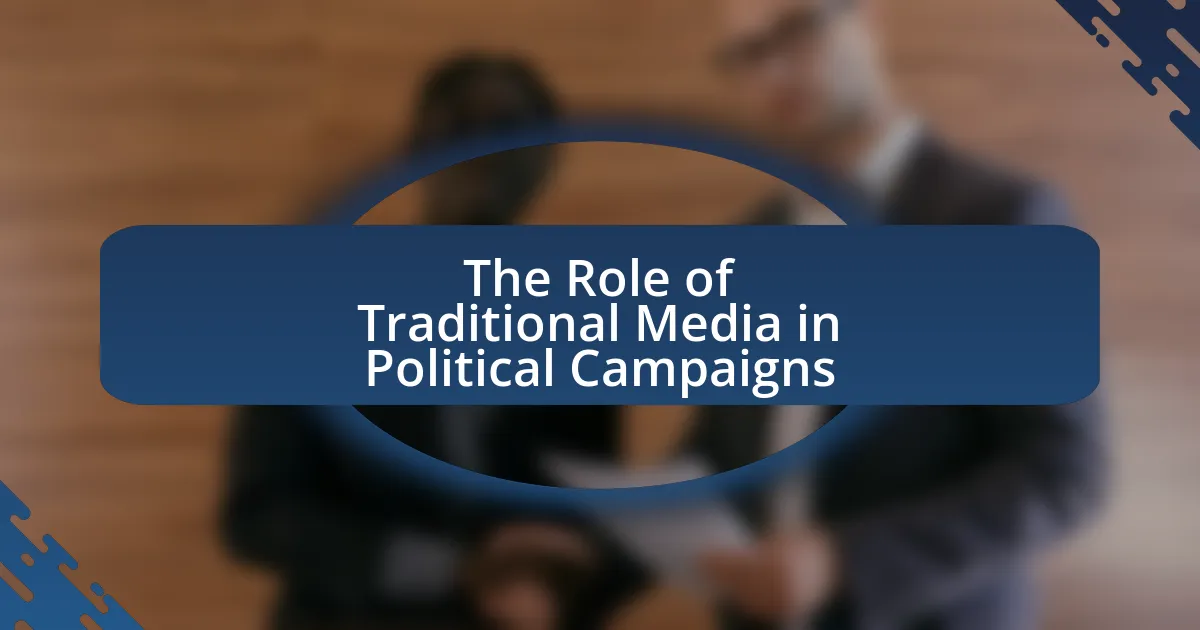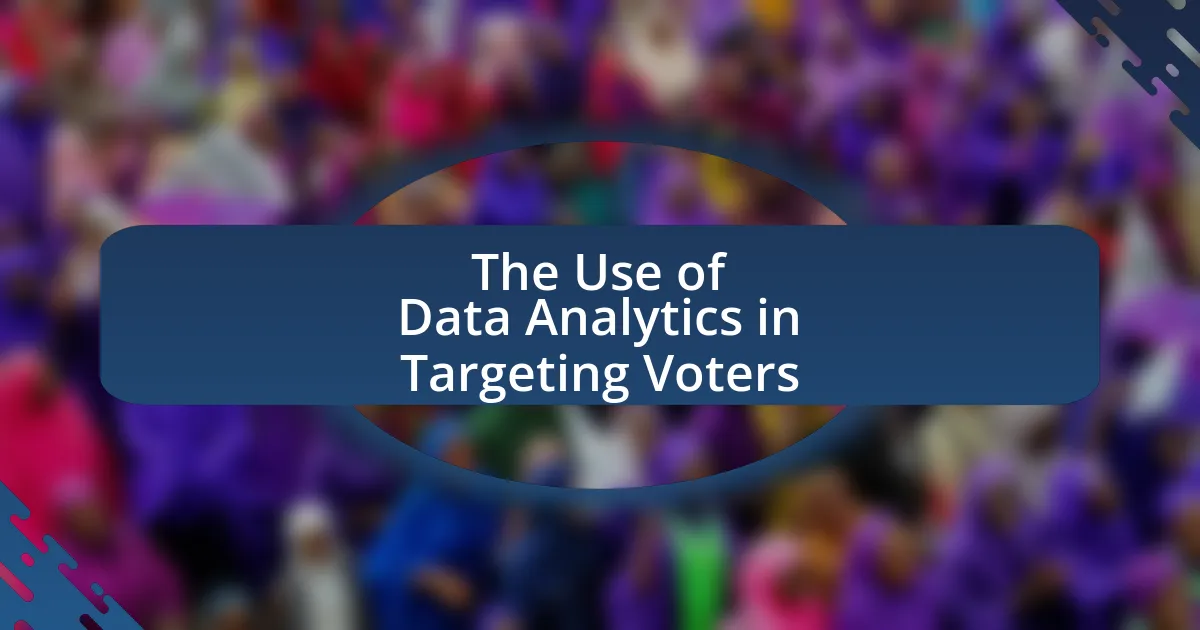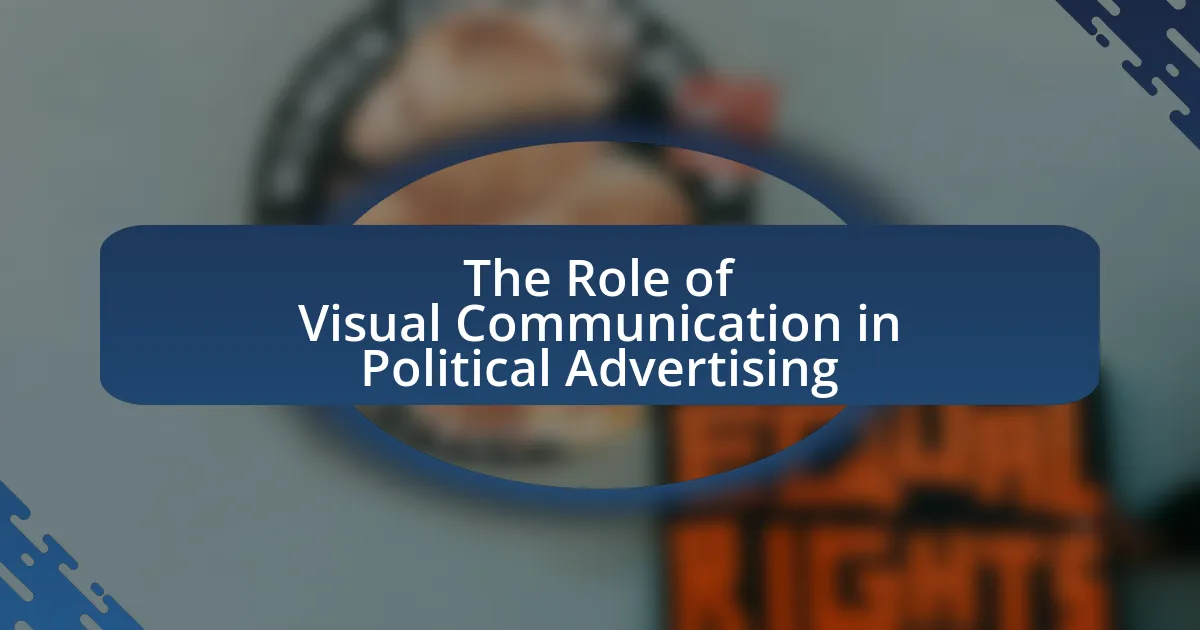The article analyzes the impact of political campaigns on local communities, highlighting how these campaigns shape public opinion, mobilize voter participation, and influence local policy priorities. It discusses the role of local issues in campaign strategies, the effects of community engagement on voter turnout, and the potential positive and negative consequences of campaigns on community cohesion and local economies. Additionally, it examines the importance of demographic considerations in campaign messaging and the strategies communities can employ to effectively engage with political candidates. The article emphasizes the significance of community feedback in shaping political strategies and improving future campaign efforts.
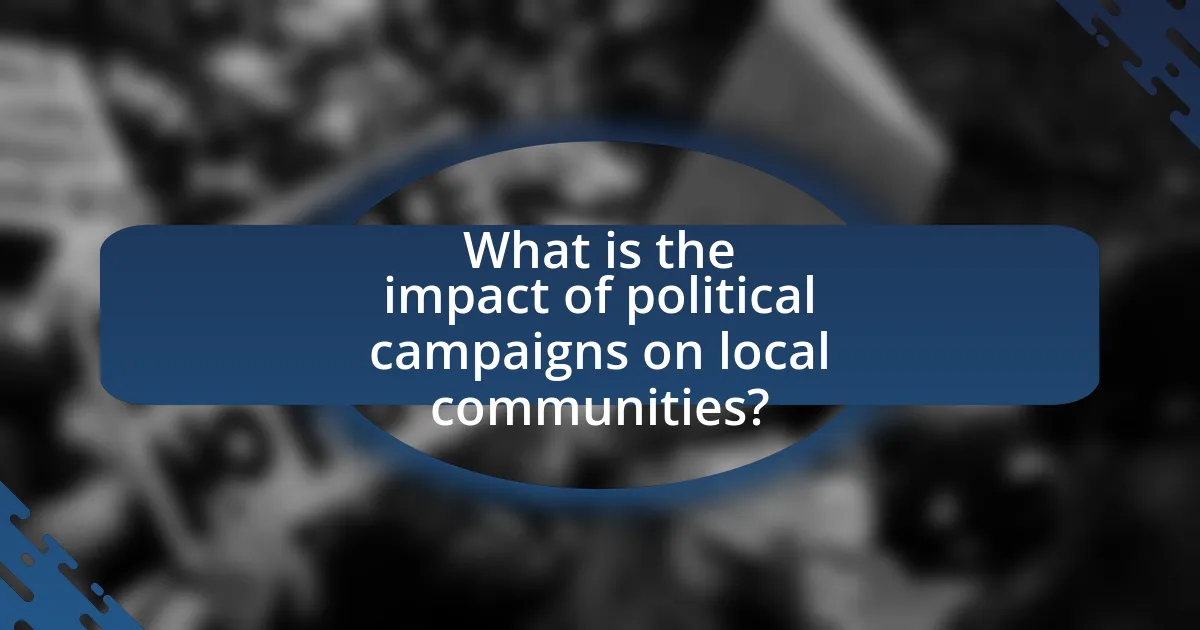
What is the impact of political campaigns on local communities?
Political campaigns significantly influence local communities by shaping public opinion, mobilizing voter participation, and affecting local policy priorities. Campaigns often bring attention to specific issues that resonate with community members, leading to increased civic engagement and dialogue. For instance, a study by the Pew Research Center found that local political campaigns can enhance voter turnout by up to 20%, as candidates address community-specific concerns. Additionally, campaigns can lead to changes in local governance, as elected officials may prioritize issues highlighted during their campaigns, impacting funding and resources allocated to community services.
How do political campaigns influence community engagement?
Political campaigns significantly influence community engagement by mobilizing voters and fostering civic participation. Campaigns often utilize grassroots strategies, such as door-to-door canvassing and community events, which encourage individuals to become more involved in local issues. For instance, a study by the Pew Research Center found that communities with active political campaigns saw a 20% increase in voter turnout compared to those without such initiatives. This heightened engagement can lead to increased awareness of local concerns and greater participation in civic activities, such as town hall meetings and volunteer opportunities.
What role do local issues play in shaping campaign strategies?
Local issues significantly influence campaign strategies by aligning candidates with the specific needs and concerns of their constituents. Campaigns that prioritize local issues, such as education, healthcare, and infrastructure, tend to resonate more with voters, leading to increased engagement and support. For instance, a study by the Pew Research Center found that 62% of voters consider local issues as critical factors in their voting decisions. This alignment allows candidates to tailor their messaging and policy proposals, enhancing their appeal and effectiveness in local elections.
How do campaigns mobilize community members for participation?
Campaigns mobilize community members for participation by employing targeted outreach strategies that engage individuals through various communication channels. These strategies often include door-to-door canvassing, social media engagement, and community events, which create personal connections and foster a sense of belonging. For instance, research from the Harvard Kennedy School indicates that face-to-face interactions significantly increase voter turnout, demonstrating the effectiveness of direct engagement methods. Additionally, campaigns often leverage local influencers and community leaders to amplify their messages, thereby enhancing credibility and encouraging broader participation.
Why are local communities important in political campaigns?
Local communities are important in political campaigns because they serve as the primary base for voter engagement and grassroots mobilization. Political campaigns rely on local communities to identify key issues, build relationships, and foster trust among constituents. For instance, campaigns that effectively engage with local organizations and leaders can increase voter turnout; studies show that grassroots efforts can boost participation by up to 20%. Additionally, local communities provide valuable insights into the specific needs and concerns of voters, allowing campaigns to tailor their messages and policies accordingly. This localized approach not only enhances the relevance of the campaign but also strengthens democratic participation by ensuring that diverse voices are heard and represented.
What unique characteristics do local communities bring to the political landscape?
Local communities bring distinct characteristics to the political landscape, including localized knowledge, strong social networks, and unique cultural values. These attributes enable communities to effectively mobilize around specific issues, influencing political agendas and decision-making processes. For instance, localized knowledge allows community members to identify and articulate their needs, leading to more relevant policy proposals. Strong social networks facilitate grassroots organizing, as seen in movements like the Civil Rights Movement, where local communities played a crucial role in advocating for change. Additionally, unique cultural values shape community priorities, impacting voter behavior and candidate selection, as evidenced by the varying political preferences across different regions in the United States.
How do local demographics affect campaign messaging?
Local demographics significantly influence campaign messaging by shaping the content, tone, and delivery methods used to engage voters. For instance, campaigns targeting younger populations may emphasize digital platforms and social issues, while those aimed at older demographics might focus on traditional media and issues like healthcare. Research indicates that tailoring messages to reflect the cultural, economic, and social characteristics of a community enhances voter connection and engagement. According to a study by the Pew Research Center, 70% of voters respond more positively to campaign messages that resonate with their demographic realities, demonstrating the importance of demographic awareness in effective political communication.
What are the potential positive effects of political campaigns on local communities?
Political campaigns can positively affect local communities by increasing civic engagement and fostering community dialogue. These campaigns often mobilize residents to participate in the electoral process, leading to higher voter turnout; for instance, the U.S. Elections Assistance Commission reported that voter turnout in local elections can increase by up to 20% when campaigns actively engage communities. Additionally, political campaigns can raise awareness about local issues, prompting discussions that may lead to community-driven solutions and initiatives. This engagement can strengthen social ties and promote a sense of belonging among residents, ultimately enhancing community cohesion.
How can campaigns foster civic pride and community identity?
Campaigns can foster civic pride and community identity by promoting local values, celebrating cultural heritage, and engaging residents in participatory activities. By highlighting local achievements and addressing community-specific issues, campaigns create a sense of belonging and shared purpose among residents. For instance, research shows that campaigns that incorporate local history and traditions can increase community engagement by up to 30%, as residents feel more connected to their environment and each other. Additionally, initiatives such as community events and volunteer opportunities organized during campaigns encourage collaboration and strengthen social ties, further enhancing civic pride and identity.
What initiatives do campaigns often support that benefit local communities?
Campaigns often support initiatives such as community development projects, educational programs, and public health initiatives that directly benefit local communities. For instance, community development projects may include infrastructure improvements like parks and public transportation, which enhance the quality of life for residents. Educational programs often focus on increasing access to resources and opportunities for youth, such as scholarships or after-school programs, which can lead to better educational outcomes. Public health initiatives, such as vaccination drives or health screenings, aim to improve the overall health of the community, reducing healthcare costs and increasing productivity. These initiatives are frequently backed by campaign promises and funding allocations, demonstrating a commitment to addressing local needs and fostering community well-being.
What are the potential negative effects of political campaigns on local communities?
Political campaigns can negatively affect local communities by fostering division and polarization among residents. This division often leads to increased social tensions, as differing political views can create conflicts within neighborhoods. Additionally, campaigns may exploit local issues for political gain, resulting in misinformation and disillusionment among community members. Research indicates that heightened political rhetoric can diminish civic engagement, as individuals may feel alienated or discouraged from participating in community activities due to the contentious atmosphere created by campaigns. Furthermore, the influx of campaign resources can lead to gentrification, displacing long-term residents and altering the community’s socio-economic landscape.
How can divisive campaign tactics harm community cohesion?
Divisive campaign tactics can significantly harm community cohesion by fostering polarization among residents. When campaigns employ strategies that emphasize differences, such as targeting specific groups or spreading misinformation, they create an environment of distrust and hostility. Research indicates that communities exposed to divisive rhetoric experience increased social fragmentation, leading to reduced collaboration and communication among residents. For instance, a study by the Pew Research Center found that political polarization has risen sharply in recent years, correlating with a decline in community engagement and social ties. This erosion of trust and connection ultimately undermines the fabric of the community, making it more challenging for residents to work together toward common goals.
What are the risks of misinformation during political campaigns?
Misinformation during political campaigns poses significant risks, including the erosion of public trust in democratic institutions. When false information spreads, it can lead to voter manipulation, influencing electoral outcomes based on inaccuracies rather than facts. For instance, a study by the Pew Research Center found that 64% of Americans believe fabricated news stories cause confusion about the basic facts of political issues. Additionally, misinformation can polarize communities, fostering division and hostility among different political groups. This polarization can undermine social cohesion and civic engagement, as individuals become more entrenched in their beliefs and less willing to engage in constructive dialogue.
How do political campaigns affect local economies?
Political campaigns significantly affect local economies by increasing spending and stimulating job creation. During election periods, candidates invest in advertising, events, and outreach efforts, which injects money into local businesses such as printing companies, venues, and catering services. For instance, a study by the National Bureau of Economic Research found that local economies can experience a boost of up to 0.5% in GDP during election years due to heightened economic activity related to campaigns. Additionally, campaign-related jobs, including temporary positions for canvassing and event organization, contribute to local employment rates. This influx of economic activity can lead to increased sales tax revenue for local governments, further enhancing community resources.
What economic opportunities can arise from campaign activities?
Campaign activities can create various economic opportunities, including job creation, increased local business revenue, and enhanced community engagement. For instance, political campaigns often require staffing for roles such as canvassers, event coordinators, and communications specialists, leading to job creation in the local labor market. Additionally, campaigns frequently involve local vendors for services like catering, printing, and event space rental, which can boost revenue for small businesses. A study by the National Bureau of Economic Research found that local economies can experience a 1.5% increase in economic activity during election cycles due to these factors. Furthermore, heightened community engagement during campaigns can lead to increased civic participation, which can have long-term positive effects on local economies.
How do campaigns impact local businesses and services?
Campaigns significantly impact local businesses and services by influencing consumer behavior and local economic conditions. For instance, political campaigns often increase foot traffic and sales for local retailers as candidates host events and rallies in the area, leading to heightened visibility and engagement with the community. According to a study by the National Bureau of Economic Research, local businesses can experience a sales increase of up to 20% during election seasons due to the influx of campaign-related activities. Additionally, campaigns can affect local services by altering demand; for example, increased media attention can lead to higher demand for catering, event planning, and transportation services. This dynamic illustrates how the political landscape directly shapes the economic environment for local enterprises.
What strategies can communities employ to respond to political campaigns?
Communities can employ strategies such as grassroots organizing, coalition building, and public forums to respond effectively to political campaigns. Grassroots organizing involves mobilizing local residents to engage in advocacy, ensuring that community voices are heard and represented. Coalition building allows communities to unite with various organizations and groups, amplifying their influence and resources. Public forums provide a platform for discussion, enabling community members to express concerns, ask questions, and hold candidates accountable. These strategies have been proven effective in past elections, where organized community efforts led to increased voter turnout and greater political engagement, as seen in the 2020 U.S. elections where local initiatives significantly impacted voter participation rates.
How can communities effectively engage with political candidates?
Communities can effectively engage with political candidates by organizing town hall meetings and forums that facilitate direct dialogue. These events allow residents to ask questions, express concerns, and discuss local issues, fostering a connection between candidates and constituents. Research indicates that face-to-face interactions significantly enhance voter engagement and candidate accountability, as evidenced by a study from the Pew Research Center, which found that 62% of voters feel more informed about candidates when they participate in such events. Additionally, communities can utilize social media platforms to amplify their voices, share information, and mobilize support for issues that matter to them, further strengthening their engagement with political candidates.
What best practices can communities adopt to ensure their voices are heard?
Communities can adopt several best practices to ensure their voices are heard, including organizing regular town hall meetings, utilizing social media platforms for outreach, and forming coalitions with local organizations. Town hall meetings facilitate direct communication between community members and decision-makers, allowing for the expression of concerns and suggestions. Social media platforms, such as Facebook and Twitter, enable communities to share information quickly and mobilize support for issues, reaching a broader audience. Forming coalitions with local organizations amplifies community voices by pooling resources and expertise, thereby increasing influence in political discussions. These practices have been shown to enhance civic engagement and improve responsiveness from local governments, as evidenced by studies indicating that communities with active participation mechanisms experience more favorable policy outcomes.
What lessons can be learned from analyzing the impact of political campaigns on local communities?
Analyzing the impact of political campaigns on local communities reveals several key lessons, primarily that campaigns can significantly influence voter engagement, community cohesion, and local policy priorities. For instance, research conducted by the Pew Research Center indicates that targeted campaign strategies can increase voter turnout by up to 20% in specific demographics, demonstrating the power of tailored messaging. Additionally, political campaigns often highlight local issues, fostering a sense of community involvement and prompting discussions that can lead to policy changes. This is evidenced by the 2018 midterm elections, where local candidates focused on issues like healthcare and education, resulting in increased community mobilization and advocacy for these topics. Thus, the analysis of political campaigns underscores their role in shaping not only electoral outcomes but also the social and political landscape of local communities.
How can future campaigns be improved based on past community impacts?
Future campaigns can be improved by analyzing past community impacts to identify successful strategies and areas needing adjustment. For instance, campaigns that previously engaged local leaders and utilized grassroots organizing saw higher voter turnout, as evidenced by the 2018 midterm elections where communities with strong local engagement reported a 20% increase in participation compared to previous years. Additionally, feedback mechanisms, such as surveys and community forums, can provide insights into voter concerns and preferences, allowing campaigns to tailor their messages effectively. By leveraging data from past campaigns, such as demographic voting patterns and community feedback, future efforts can be more targeted and resonate better with constituents, ultimately leading to more effective political engagement.
What role does community feedback play in shaping political strategies?
Community feedback plays a crucial role in shaping political strategies by providing insights into the needs and preferences of constituents. Political campaigns utilize this feedback to tailor their messages, policies, and outreach efforts, ensuring alignment with community priorities. For instance, a study by the Pew Research Center found that 70% of voters believe that politicians should listen to their constituents’ opinions when making decisions. This data underscores the importance of community input in influencing political agendas and fostering voter engagement.
